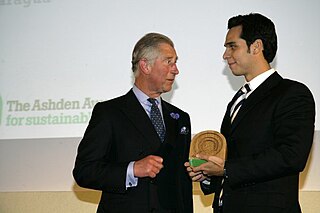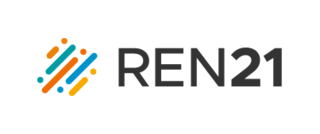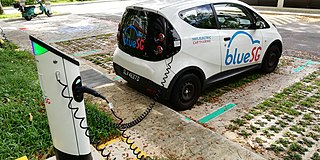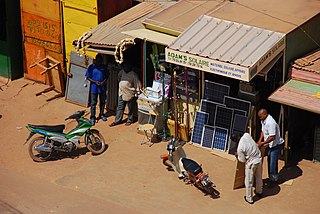
The International Energy Agency (IEA) is a Paris-based autonomous intergovernmental organisation, established in 1974, that provides policy recommendations, analysis and data on the global energy sector. The 31 member countries and 13 association countries of the IEA represent 75% of global energy demand.

Ashden is a London-based charity that works in the field of sustainable energy and development. Its work includes the annual Ashden Awards, advocacy and research in the field of sustainable energy, and mentoring and practical support for award winners.

REN21 is a think tank and a multistakeholder governance group which is focused on renewable energy policy.

Clean technology, in short cleantech or climatetech, is any process, product, or service that reduces negative environmental impacts through significant energy efficiency improvements, the sustainable use of resources, or environmental protection activities. Clean technology includes a broad range of technology related to recycling, renewable energy, information technology, green transportation, electric motors, green chemistry, lighting, grey water, and more. Environmental finance is a method by which new clean technology projects can obtain financing through the generation of carbon credits. A project that is developed with concern for climate change mitigation is also known as a carbon project.
reegle (lower-case) was a search engine specifically covering the fields of renewable energy, efficient energy use, and climate change issues. It was developed in 2005 by REEEP and REN21, with funding from several European government agencies. At one point, it had 220,000 visitors per month.
Energy Saving Trust is a British organization devoted to promoting energy efficiency, energy conservation, and the sustainable use of energy, thereby reducing carbon dioxide emissions and helping to prevent man-made climate change. It was founded in the United Kingdom as a government-sponsored initiative in 1992, following the global Earth Summit.
The Office of Energy Efficiency and Renewable Energy (EERE) is an office within the United States Department of Energy. Formed from other energy agencies after the 1973 energy crisis, EERE is led by the Assistant Secretary of Energy Efficiency and Renewable Energy, who is appointed by the president of the United States and confirmed by the U.S. Senate. Alejandro Moreno currently leads the office as the Acting Assistant Secretary.

The developing nations of Africa are popular locations for the application of renewable energy technology. Currently, many nations already have small-scale solar, wind, and geothermal devices in operation providing energy to urban and rural populations. These types of energy production are especially useful in remote locations because of the excessive cost of transporting electricity from large-scale power plants. The applications of renewable energy technology has the potential to alleviate many of the problems that face Africans every day, especially if done in a sustainable manner that prioritizes human rights.

Renewable energy in developing countries is an increasingly used alternative to fossil fuel energy, as these countries scale up their energy supplies and address energy poverty. Renewable energy technology was once seen as unaffordable for developing countries. However, since 2015, investment in non-hydro renewable energy has been higher in developing countries than in developed countries, and comprised 54% of global renewable energy investment in 2019. The International Energy Agency forecasts that renewable energy will provide the majority of energy supply growth through 2030 in Africa and Central and South America, and 42% of supply growth in China.

SolarAid is an international development charity which is working to create a sustainable market for solar lights in Africa. In line with the Sustainable Development Goal 7: "Ensure access to affordable, reliable, sustainable and modern energy for all", the organisation's aim is to reduce global poverty and climate change through providing access to solar lights for rural communities. SolarAid wholly owns the social enterprise, SunnyMoney, the largest seller of solar lights in Africa. SolarAid was founded by Solarcentury, a solar energy company based in the UK.
The International Renewable Energy Conference (IREC) is a meeting of senior-level representatives, such as those from the Executive and Legislative branches of national or sub-national governments, international organizations, the finance and business community, or civil societies, working towards the advancement and integration of renewable energy in their countries.
Sunlabob Renewable Energy is a Lao commercial company that provides sustainable renewable solutions to areas that are off the electrical grid. It was licensed in 2001 and its headquarters and base are in Vientiane, the capital of the Democratic People's Republic of Laos. The company operates as a profitable, full-service renewable energy provider selling hardware and providing commercially viable energy services.
The GLOBAL ENVIRONMENTAL INSTITUTE (GEI) was founded in the U.S. in 2003 and was registered as an independent non-profit organization in the State of Delaware. GEI's mission was to design and implement market-based models for solving environmental problems in order to achieve development that is economically, ecologically, and socially sustainable. GEI was dissolved in October 2011. GEI's sister organization, the independent Beijing Chaoyang District Sustainable Global Environmental Institute in China (GEI-China) remains active.
A Green bond is a fixed-income financial instruments (bond) which is used to fund projects that have positive environmental and/or climate benefits. They follow the Green Bond Principles stated by the International Capital Market Association (ICMA), and the proceeds from the issuance of which are to be used for the pre-specified types of projects.
E+Co is a non-governmental organization based in Bloomfield, New Jersey, United States, that from its founding in 1994 to its restructuring in 2012 made over 250 clean energy investments in developing countries. Over these 18 years, E+Co maintained field offices in San Jose, Costa Rica, Bangkok, Thailand, Dar es Salaam, Tanzania and Accra, Ghana. The company's name is pronounced, "E and Co".

The RETScreen Clean Energy Management Software is a software package developed by the Government of Canada. RETScreen Expert was highlighted at the 2016 Clean Energy Ministerial held in San Francisco. The Government of Canada's Treasury Board Secretariat uses RETScreen Expert as its greenhouse gas reporting tool for all federal departments and agencies required to report emissions.
Energy for All is the name of an initiative and partnership, both of which are founded by the Asian Development Bank (ADB), to reduce energy poverty in Asia and the Pacific.
Energy use and development in Africa varies widely across the continent, with some African countries exporting energy to neighbors or the global market, while others lack even basic infrastructures or systems to acquire energy. The World Bank has declared 32 of the 48 nations on the continent to be in an energy crisis. Energy development has not kept pace with rising demand in developing regions, placing a large strain on the continent's existing resources over the first decade of the new century. From 2001 to 2005, GDP for over half of the countries in Sub Saharan Africa rose by over 4.5% annually, while generation capacity grew at a rate of 1.2%.

Most of Kenya's electricity is generated by renewable energy sources. Access to reliable, affordable, and sustainable energy is one of the 17 main goals of the United Nations’ Sustainable Development Goals. Development of the energy sector is also critical to help Kenya achieve the goals in Kenya Vision 2030 to become a newly industrializing, middle-income country. With an installed power capacity of 2,819 MW, Kenya currently generates 826 MW hydroelectric power, 828 geothermal power, 749 MW thermal power, 331 MW wind power, and the rest from solar and biomass sources. Kenya is the largest geothermal energy producer in Africa and also has the largest wind farm on the continent. In March 2011, Kenya opened Africa's first carbon exchange to promote investments in renewable energy projects. Kenya has also been selected as a pilot country under the Scaling-Up Renewable Energy Programmes in Low Income Countries Programme to increase deployment of renewable energy solutions in low-income countries. Despite significant strides in renewable energy development, about a quarter of the Kenyan population still lacks access to electricity, necessitating policy changes to diversify the energy generation mix and promote public-private partnerships for financing renewable energy projects.
Open energy system database projects employ open data methods to collect, clean, and republish energy-related datasets for open use. The resulting information is then available, given a suitable open license, for statistical analysis and for building numerical energy system models, including open energy system models. Permissive licenses like Creative Commons CC0 and CC BY are preferred, but some projects will house data made public under market transparency regulations and carrying unqualified copyright.









